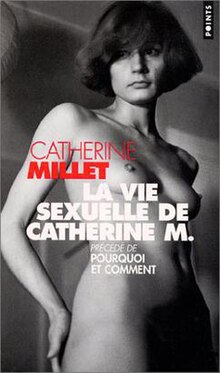 Cover of French paperback edition | |
| Author | Catherine Millet |
|---|---|
| Original title | La Vie Sexuelle de Catherine M. |
| Translator | Adriana Hunter |
| Language | French |
| Genre | Memoir |
| Published | 2001 |
| Publisher | Grove Press |
| Publication place | France |
| Media type | Print (Hardback) |
| Pages | 224 pp |
| ISBN | 0-8021-3986-8 |
| OCLC | 52275327 |
The Sexual Life of Catherine M. by the art critic Catherine Millet was published in the author's native French in 2001 (as La vie sexuelle de Catherine M.) An English translation by Adriana Hunter was published in 2002. Sexual Life was the subject of mild controversy on both sides of the Atlantic. It was reviewed by Edmund White as "the most explicit book about sex ever written by a woman." [1] The book won the Prix Sade in France.